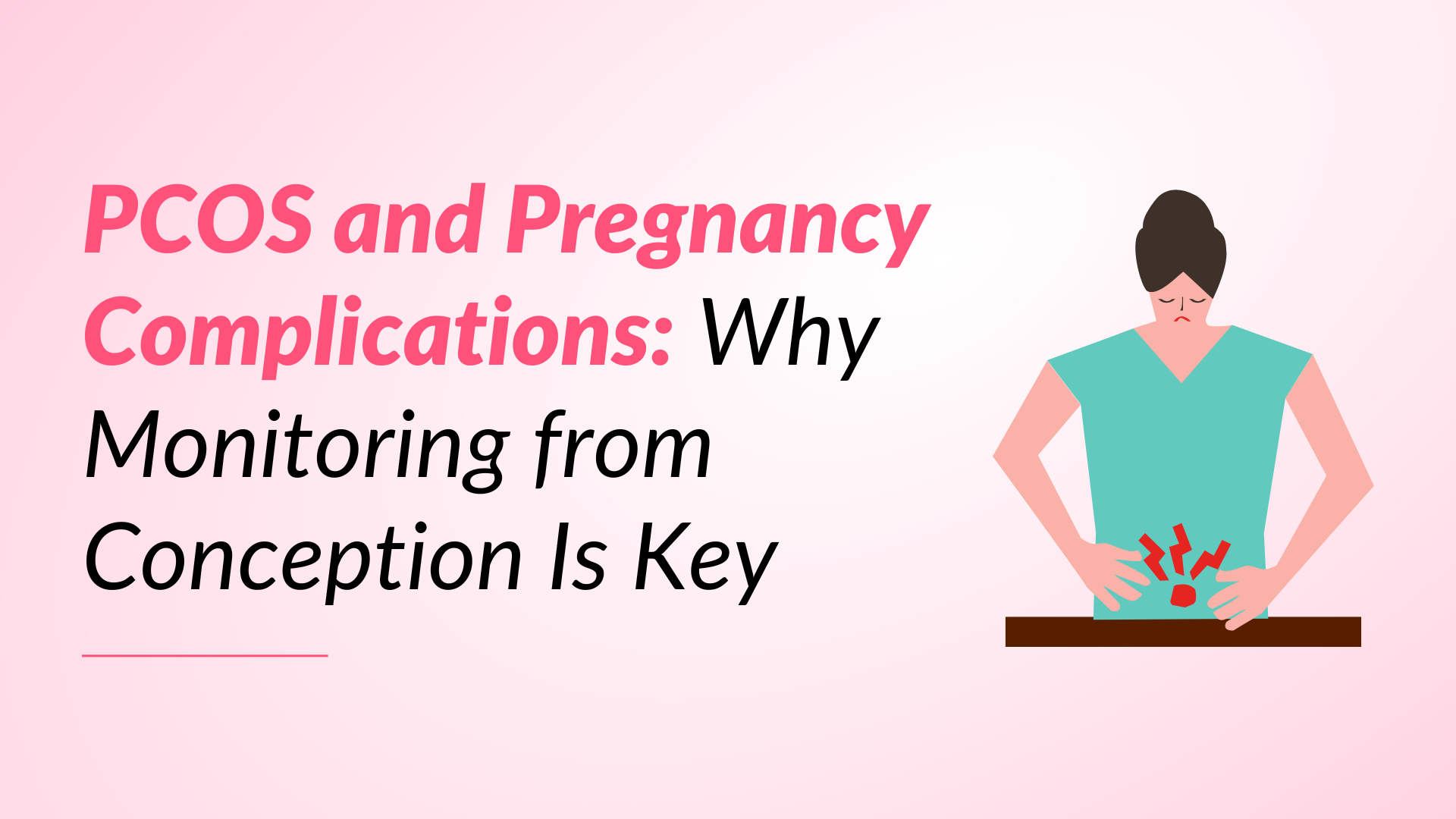PCOS and Pregnancy Complications: Why Monitoring from Conception is Key
Reviewed By: Dr. Anusha Kushanapally, fertility specialist at Ferty9 Fertility Clinic, Warangal
Polycystic ovarian syndrome is a prevalent endocrine condition that has serious consequences for women during their reproductive years. 6 to 15 percent of women who are of reproductive age suffer from polycystic ovarian syndrome or PCOS complications . Having a PCOS diagnosis may make getting pregnant more challenging. Contrary to its associated characteristics, PCOS is not frequently included in pregnancy care guidelines as a risk factor for poor pregnancy and delivery outcomes. Many women with PCOS can conceive and have safe pregnancies with the proper medical care, lifestyle changes, and close monitoring. Advances in reproductive treatments, such as IVF, have greatly increased success rates for women with PCOS.
Understanding PCOS and Its Effects on Fertility
Hormonal imbalance and metabolic issues may impact the general health and appearance of women with PCOS. A person's fertility may be impacted by PCOS complications in a number of ways. For women with PCOS, ovulation issues are typically the main cause of infertility. Ovulation may not happen due to an increase in testosterone production or due to improper development of ovarian follicles. Even if ovulation occurs, hormonal imbalances may prevent the uterine lining from properly developing, preventing mature egg implantation. Unbalanced hormones can cause irregular ovulation and menstruation. Unpredictable menstrual cycles can make it harder to become pregnant. Polycystic ovarian syndrome is associated with reproductive difficulties, including infertility, as well as pregnancy-related issues such as miscarriage, hypertensive disorders, gestational diabetes, and preterm birth.
Also read: PCOD vs PCOS: How Are They Different
Common Pregnancy Complications in Women with PCOS
A growing body of research suggests that PCOS may have serious consequences for a woman's and her children's pregnancy outcomes and long-term health. Women with Polycystic Ovary Syndrome (PCOS) are at a higher risk of experiencing pregnancy complications, which can range from mild issues to severe consequences, depending on individual health factors and management strategies.
Gestational Diabetes:
Gestational diabetes is more common in women with Polycystic Ovary Syndrome (PCOS). This condition develops when high blood sugar levels occur during pregnancy. Though often asymptomatic, obesity and PCOS increase risks such as pre-eclampsia, cesarean delivery, and embryo macrosomia. If uncontrolled, gestational diabetes may negatively impact the pregnancy, potentially leading to severe complications like stillbirth.
Preeclampsia:
Pregnant women with PCOS are more likely to develop preeclampsia, or pregnancy-induced hypertension. Preeclampsia is a severe illness characterized by the abrupt onset of high blood pressure, typically after 20 weeks of pregnancy. This can have an impact on a number of organs, including the kidneys and liver.
Suggested read: How Do Autoimmune Diseases Impact Fertility and Pregnancy?
Miscarriage:
According to recent studies, women with PCOS are three times more likely to miscarry than healthy women. This could be related to an overabundance of androgens. High insulin levels may impair the health of the uterus and potentially affect the health of the baby, increasing the risk of pregnancy complications, including the possibility of premature loss.
Suggested read: Steps to Prepare for Pregnancy Following a Miscarriage
Preterm Birth:
Premature delivery, also known as premature birth, is defined as giving birth before 37 weeks gestation or three weeks early, and it poses a significant risk to women with PCOS. Preterm birth in women with PCOS can be caused by preterm labor, cervical insufficiency, hypertensive problems, and other factors. Birth outcomes may be related to the metabolic and endocrine disorders that are frequently seen in women with PCOS.
Importance of Monitoring from Conception
For women with polycystic ovarian syndrome (PCOS), monitoring is crucial from the moment of conception in order to enhance fertility and pregnancy outcomes. Before getting pregnant, women with PCOS should consult a doctor to determine their risk factors and improve their health. Women with PCOS who are at a higher risk of infertility because of diabetes or elevated body mass index should pay particular attention to these factors. Diabetes screening should be done both before and during pregnancy in women with PCOS to avoid complications. Monitoring is crucial during the pregnancy process to prevent an increased risk of pregnancy issues, such as preterm birth, gestational diabetes, preeclampsia, and early pregnancy loss.
Lifestyle Modifications to Minimize Risks
Although there isn't a cure for PCOS, you can control your symptoms by changing your lifestyle.
- Polycystic Ovarian Syndrome is positively impacted by exercise. In addition to aiding in weight loss, it may also lower blood testosterone levels. Short-term weight loss can improve insulin resistance and help you regain ovulation and fertility .
- Insulin resistance is a common condition among PCOS patients. This occurs when your body reacts poorly to insulin. A healthy diet can help you control your PCOS. Increasing your intake of fiber will aid in the fight against insulin resistance.
- For those with PCOS, lean protein sources like tofu, chicken, and fish are very satisfying and nourishing food choices, even though they don't contain fiber.
- Women with PCOS have a type of inflammation that stimulates their ovaries to produce androgens, so anti-inflammatory foods and spices, like tomatoes and turmeric, would be helpful in bringing down the inflammation. Foods that help reduce inflammation are beneficial.
The Role of Fertility Clinics in Managing PCOS Pregnancies
By providing specialized medications to control ovulation and increase the likelihood of conception, fertility clinics are essential in the management of PCOS pregnancy complications . Ferty9 clinics specialize in hormonal imbalances, modern reproductive technologies, and close pregnancy monitoring. Their experienced teams provide individualized treatment strategies to reduce PCOS risks for both mother and baby. Ferty9 also emphasizes lifestyle management, including nutrition and weight control advice, to help women with PCOS achieve better fertility and pregnancy outcomes. Their complete care includes stress management and mental health support, which address the emotional issues that come with PCOS pregnancy. This comprehensive strategy promotes positive outcomes and healthy pregnancies.
Find Hope and Solutions for Female Infertility and Male Infertility — Explore Our Comprehensive Services
IVF Treatment
IUI Treatment
ICSI Treatment
PICSI Treatment
Fertility Preservation Service
Blastocyst Culture & Transfer Treatment Genetic Screening & Testing
Conclusion
PCOS and pregnancy complications necessitate close monitoring to provide the best outcomes for the mother as well as the baby. Early detection and continuous care can assist in managing concerns such as gestational diabetes, hypertension, and premature birth. Regular monitoring allows for timely interventions, resulting in a safer pregnancy journey. Personalized care plans, which include lifestyle changes and medicinal support, are required to treat PCOS issues. Women with PCOS can have good pregnancies and reduce problems with careful care.
Visit Our Clinic:
Fertility Clinic in Hyderabad
Fertility Clinic in Visakhapatnam
Fertility Clinic in Vijayawada
Fertility Clinic in Karimnagar
Fertility Clinic in Rajahmundry
Fertility Clinic in Tirupati
Fertility Clinic in Kurnool

Write your message


